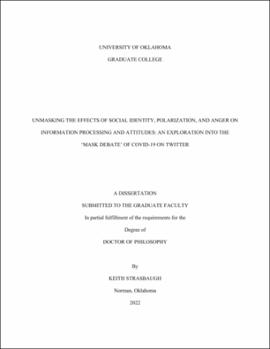| dc.contributor.advisor | Connelly, Shane | |
| dc.contributor.author | Strasbaugh, Keith | |
| dc.date.accessioned | 2022-05-06T20:01:22Z | |
| dc.date.available | 2022-05-06T20:01:22Z | |
| dc.date.issued | 2022-05 | |
| dc.identifier.uri | https://hdl.handle.net/11244/335589 | |
| dc.description.abstract | The ‘mask debate’ surrounding COVID-19 (i.e., whether or not to wear a mask) has generated contention in online forums such as Twitter, where observed division of perspectives often runs along lines of social identity (e.g., political affiliation). Much of the research prior to COVID-19 suggests that social identity and the extent to which social media posts are polarizing exerts differential effects on user experiences. However, little research examines how social identity affects information processing of online COVID-19 discussions. Additionally, the question of how anger reactions, an emotion commonly explored in Twitter studies, may function on a more specific level (i.e., righteous vs. self-righteous) remains underexamined as well. Participants read and responded to a simulated Twitter feed focusing on the COVID-19 mask debate. Content polarization and explicit references to social identity groups were manipulated to assess their effects on three outcomes: 1) righteous and self-righteous anger, 2) biased processing of information contained in the Twitter feed (i.e., confirmation bias, selective attention bias, emotional content bias, commitment bias), and 3) attitudinal stance and strength regarding the topic of the Twitter feed. Additionally, righteous and self-righteous anger were explored as mediators of the relationships of social identity and polarization to cognitive biases and attitudes about the topic. Findings indicate effects of social identity on self-righteous anger, but not righteous anger, and polarization on strength of attitudes, confirmation bias and emotional content bias. Implications and future directions are discussed.
Keywords: Social identity; polarization; anger; cognitive biases | en_US |
| dc.language | en | en_US |
| dc.rights | Attribution-NoDerivatives 4.0 International | * |
| dc.rights.uri | https://creativecommons.org/licenses/by-nd/4.0/ | * |
| dc.subject | Psychology, Industrial. | en_US |
| dc.subject | Psychology, General. | en_US |
| dc.subject | Psychology, Experimental. | en_US |
| dc.title | Unmasking the Effects of Social Identity, Polarization, and Anger on Information Processing and Attitudes: An Exploration into the ‘Mask Debate’ of COVID-19 on Twitter | en_US |
| dc.contributor.committeeMember | Mendoza, Jorge | |
| dc.contributor.committeeMember | Miller, Claude | |
| dc.contributor.committeeMember | Mumford, Michael | |
| dc.date.manuscript | 2022-05 | |
| dc.thesis.degree | Ph.D. | en_US |
| ou.group | Dodge Family College of Arts and Sciences::Department of Psychology | en_US |

